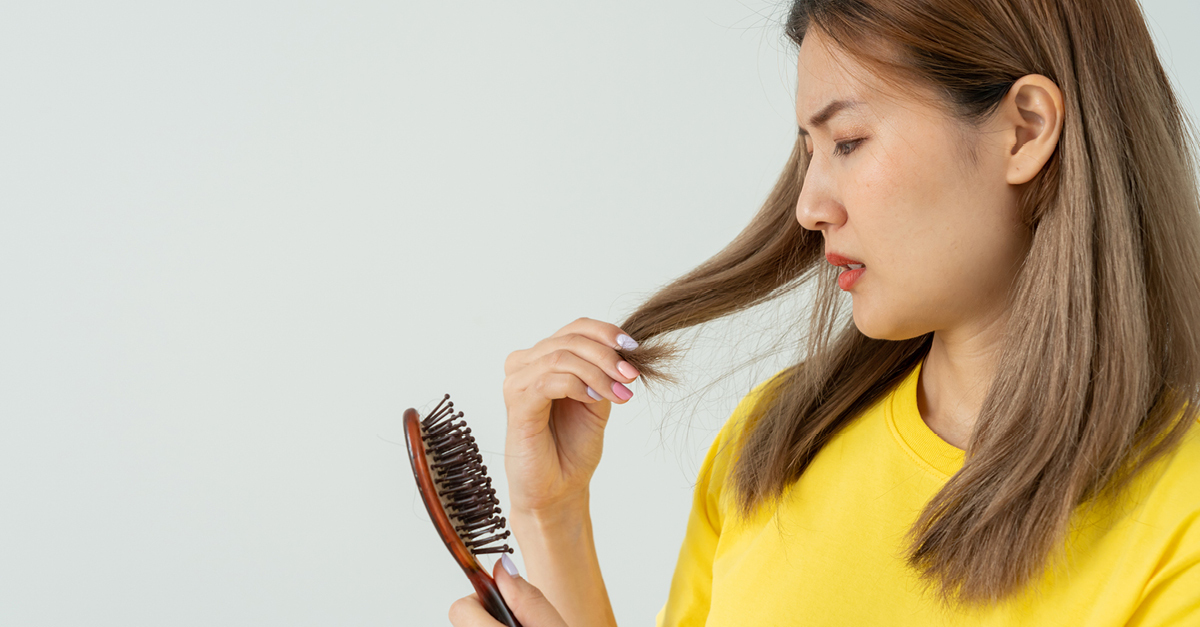Expert Advice

Acella Pharmaceuticals, LLC., is partnering with Lindy Ford, RD, LDN to bring greater awareness to the importance of thyroid care and education. This post is sponsored by Acella Pharmaceuticals and should not be construed as medical advice. Please talk to your doctor about your individual medical situation.
Disclaimer: The information provided is for educational purposes only and does not substitute for professional medical advice. Consult a medical professional or health care provider before beginning any exercise, fitness, diet or nutrition routine.
Some hair loss is normal. On average, we lose about 100 hairs each day. If you notice, though, that your hair is thinning, you may have a thyroid problem. If you’re not sure, ask a hairstylist who has been working with you for a while. He or she will usually know.
Thyroid hair loss usually manifests in thinning over your entire head instead of as localized bald spots.
You may also have loss of hair from other parts of your body. A unique symptom of hypothyroidism is hair loss on the outer edges of your eyebrows.
Why does hypothyroidism cause hair loss?
Hair starts growing at the root in your hair follicle, located within the scalp. It gets fed by the root’s blood vessels; this makes the hair grow. Hair pushes out through your skin and grows for a while but then falls out as each new regrowth cycle begins.
Hypothyroidism causes thyroid hormone production to be disrupted – especially the conversion of T4 to the active form, T3. When this disruption happens, it affects the life cycle of each strand of hair. This includes the development of hair at the root, how long it grows before falling out, and new growth replacement.
Other problems can also exacerbate hair loss. There are nutrient deficiencies common in hypothyroidism that cause hair loss. I will address them below.
What can I do to stop hair loss caused by hypothyroidism?
1. Make sure your thyroid levels are optimal.
This has to be the first step. Ask your health care provider for a full thyroid panel including TSH, Free T3, Free T4 and Reverse T3. If any of those levels are abnormal, it would be a good idea
to have thyroid antibody tests done to rule out Hashimoto’s disease.
Finding out if your thyroid levels are “normal” is tricky. I don’t go by “conventional normal values” for these tests. I like to follow values that are more functional to determine if levels are normal.
If you need more info about functional normal values, this article by Dr. Amy Meyer, M.D., is helpful: https://www.amymyersmd.com/article/thyroid-test-results
Many health practitioners only run the TSH test to determine if the thyroid is healthy. This level is not enough to determine if you have a problem.
Talk to your health care practitioner about thyroid medication if your levels are low. I present with thyroid disease and have been taking NP Thyroid® for years. It works better for me than synthetic medication because it’s naturally-derived porcine thyroid and contains more than one of the thyroid hormones.
2. Consume a nutrient-dense, anti-inflammatory diet.
I know I sound like a broken record by now, but I’m not going to stop emphasizing the importance of eating a diet packed with nutrients, including good fats, for maximum absorption of those nutrients.
Eat an abundance of foods such as low glycemic (sugar) vegetables, wild-caught seafood, nuts, seeds, unsweetened nut butters and milks, grassfed meat, healthy fats, some fruits and a limited amount of higher carb foods such as oatmeal and quinoa. Limit dairy to only A2 dairy or organic.
My website contains nutrient-dense, delicious recipes you can try.
I like to tell my patients to “add before you subtract,” but subtraction will benefit you. Ditch the toxic, inflammatory foods that contain gluten (wheat, etc.), seed oils (soybean, vegetable, sunflower, canola, etc.) and sugar.
3. Add extra therapeutic nutrients
Sometimes supplementation is needed to treat nutritional deficiencies and get to therapeutic levels
Methylated B Vitamins containing Biotin
Supplementation with B complex with methylated B12, folic acid along with biotin, and other B vitamins is a great adjunct to a nutrient-dense, anti-inflammatory diet.
Deficiencies in the B vitamins are associated with hair loss.1 B vitamins are essential to condition and strengthen the hair.
Biotin (vitamin B7) is an essential B vitamin that helps with the production of keratin (the protein responsible for the forming of nails, skin and hair). Research shows that a lack of biotin in your system can lead to hair loss.2
Iron
It’s common for hypothyroid patients not to absorb iron well. This can be seen in low levels of ferritin, which is the protein that stores iron.1 Low ferritin can cause excessive hair loss. If you have low ferritin, you also have an iron deficiency.
Some ferritin is stored in hair follicles. Whenever your body is low in iron, it can essentially “borrow” ferritin from your hair follicles and other sources that are less vital to the body. This can cause hair loss.4
It’s important to consume not only iron-rich foods but vitamin C-rich foods (such as bell peppers, cabbage and grapefruit) combined with iron-rich foods. Vitamin C helps iron to be absorbed.
If your ferritin is low, you may also wish to supplement with iron, but first, talk to your health care provider. I recommend a small dose of iron in the form of ferrous bisglycinate. It’s also non- constipating. You never want to take large doses of iron.
Vitamin D
Vitamin D plays an important role in the health of your hair follicles and hair growth. Vitamin D deficiency is shown in people with significant hair loss.4
One study showed that those with hair loss had significantly lower blood levels of vitamin D then people without hair loss. Twenty percent of the people studied presented with low ferritin levels, and nearly 80% of the people with hair loss had low vitamin D levels.5
Research has shown that vitamin D supplementation promotes hair regrowth in some people with vitamin D deficiency.4
On a personal note, as I wrote earlier, I present with Hashimoto’s thyroiditis. When I was first diagnosed, I experienced significant hair thinning. Since then, all of my thyroid levels have been normalized with NP Thyroid®. I eat a nutrient-dense, anti-inflammatory diet and don’t have any nutritional deficiencies. My hair has never been healthier, shinier or thicker. Everyone’s physiology is different, but I hope that gives you encouragement and confidence that you may find a solution that is right for you.
*Naturally derived refers to the biological nature of the porcine-derived desiccated thyroid ingredient fond in the product.
REFERENCES: 1. Almohanna, Hind et al. The Role of Vitamins and Minerals in Hair Loss: A Review. Dermatol Ther (Heidelb) . 2019 Mar;9(1):51-70. 2. Trüeb, Ralph, MD. Serum Biotin Levels in Women Complaining of Hair Loss. Int J Trichology. 2016 Apr-Jun; 8(2): 73–77. doi: 10.4103/0974-7753.188040. 3. Deloche, Claire; Bastien, Philippe et al. Low iron stores: a risk factor for excessive hair loss in non-menopausal women Eur J Dermatol. 2007 Nov-Dec;17(6):507-12. doi: 10.1684/ ejd.2007.0265. Epub 2007 Oct 19. 4. Hoot, Joyce et al. Nonscarring alopecia associated with vitamin D deficiency. Cutis. 2018 Jul;102(1):53-55. PMID: 30138496. 5. Funda, Tamer et al. Serum ferritin and vitamin D levels should be evaluated in patients with diffuse hair loss prior to treatment. Postepy Dermatol Alergol. 2020 Jun; 37(3): 407–411. Published online 2020 Jul 16. doi: 10.5114/ ada.2020.96251
2817-v1
Note that DTE products, including NP Thyroid®, have not been reviewed by the FDA for safety or efficacy.
IMPORTANT RISK INFORMATION, INCLUDING BOXED WARNING & INDICATIONS
Important Risk Information
Drugs with thyroid hormone activity, alone or together with other therapeutic agents, have been used for the treatment of obesity. In euthyroid patients, doses within the range of daily hormonal requirements are ineffective for weight reduction. Larger doses may produce serious or even life-threatening manifestations of toxicity, particularly when given in association with sympathomimetic amines such as those used for their anorectic effects.
- NP Thyroid® is contraindicated in patients with uncorrected adrenal insufficiency, untreated thyrotoxicosis, and hypersensitivity to any component of the product.
- In the elderly and in patients with cardiovascular disease, NP Thyroid® should be used with greater caution than younger patients or those without cardiovascular disease.
- Use of NP Thyroid® in patients with diabetes mellitus or adrenal cortical insufficiency may worsen the intensity of their symptoms.
- The therapy of myxedema coma requires simultaneous administration of glucocorticoids.
- Concomitant use of NP Thyroid® with oral anticoagulants alters the sensitivity of oral anticoagulants. Prothrombin time should be closely monitored in thyroid-treated patients on oral anticoagulants.
- In infants, excessive doses of NP Thyroid® may produce craniosynostosis.
- Partial loss of hair may be experienced by children in the first few months of therapy but is usually transient.
- Adverse reactions associated with NP Thyroid® therapy are primarily those of hyperthyroidism due to therapeutic overdosage.
- Many drugs and some laboratory tests may alter the therapeutic response to NP Thyroid ®. In addition, thyroid hormones and thyroid status have varied effects on the pharmacokinetics and actions of other drugs. Administer at least 4 hours before or after drugs that are known to interfere with absorption. Evaluate the need for dose adjustments when regularly administering within one hour of certain foods that may affect absorption.
- NP Thyroid® should not be discontinued during pregnancy, and hypothyroidism diagnosed during pregnancy should be promptly treated.
Indications
NP Thyroid® (thyroid tablets, USP) is a prescription medicine that is used to treat a condition called hypothyroidism from any cause, except for cases of temporary hypothyroidism, which is usually associated with an inflammation of the thyroid (thyroiditis). It is meant to replace or supplement a hormone that is usually made by your thyroid gland.
NP Thyroid® is also used in the treatment and prevention of normal functioning thyroid goiters, such as thyroid nodules, Hashimoto’s thyroiditis, multinodular goiter, and in the management of thyroid cancer.
Revised
10/2023
You Are About To Leave This Website
By clicking continue, this link will take you to a website to which Alora Pharmaceuticals’ Policies & Terms of Use do not apply.
